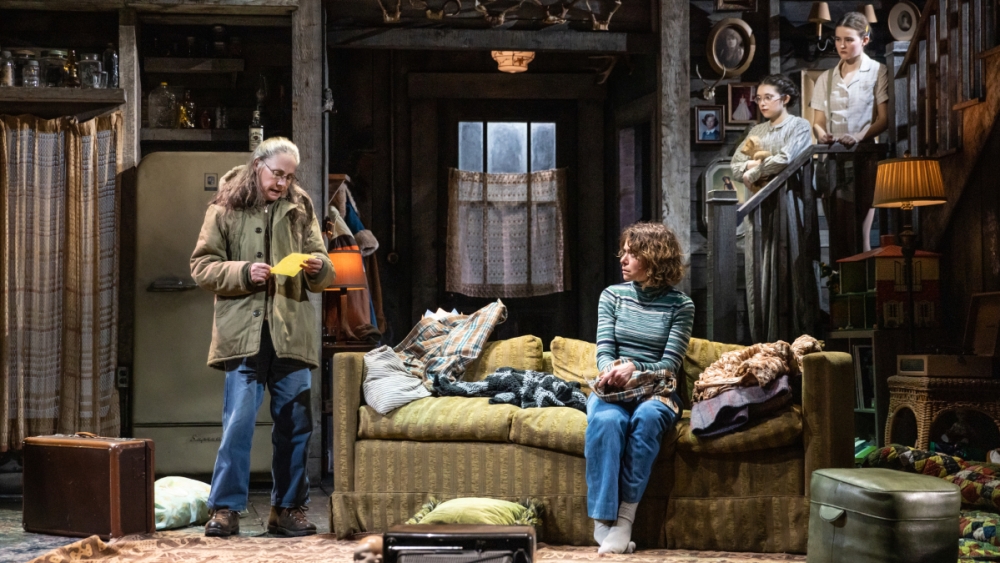‘Grey House’ Review: Broadway Play Is a Spooky, Oblique Thriller
Playwright Levi Holloway’s “Grey House” arrives on Broadway with the vibe of a spooky cinematic thriller. Pulses do rise, and the mind races forward with every blackout and bang. But save for a fleeting few discomforting images of dead pigeons, dogs and one flayed limb, the fear here is an intellectualized, existential experience.
Closer to eerily meditative film noir than a Jason Blum fear-fest, “Grey House” — which first opened at Chicago’s A Red Orchid Theatre in 2019 — recalls John Huston’s 1948 movie “Key Largo” in its mix of unwanted visitors and scheming home inhabitants. It also nods to Eugène Ionesco with fate and grief as psychic signposts, and similarly evokes Sam Shepherd’s misery-soaked “Curse of the Starving Class” with haunted, teenaged girls on its frontlines.
But are they actually teenage girls? Deaf, tinkering Bernie, precocious Marlow, fleet-of-foot Squirrel and the kindly, inquisitive and surprisingly named A1656 are the daughters of mama Raleigh (Laurie Metcalf), all living together in a house in the woods. One snow-bound night, cross-country travelers Max (Tatiana Maslany) and Henry (Paul Sparks), waylaid by an accident (or fate?), come to call.
Who is that much older “daughter” popping out from under sofa cushions? What’s in the dry-ice-smoky basement? Why is the “elixir” that Henry drinks to ease his pain named and dated after previous visitors to the house? Why does Max insist on playing hellish mind games with these kids when all they want is to pull her secrets from her? What on Earth actually prevents Max and Henry from leaving this gray house?
These raw-knuckled riddles are what drive Holloway’s challengingly experimental meditation on the predestination of pain. For while the playwright has provided notes about grieving children who died horrible deaths at the hands of men needing love, those ideas filter into “Grey House” with more poetry than specificity. The drearily in-between shades of gray here represent a purgatory, a waystation between Heaven and Hell. Who will end up where, and how badly hurt they are when they leave, are the only questions that get any sort of resolution by play’s end.
The script can drag and the metaphors pile higher that Jenga blocks, but the oblique text of “Grey House” never lacks for intrigue and edge-of-your-seat fascination. And the show’s fine cast and creatives do their best to make it all less impenetrable.
Director Joe Mantello (“Wicked,” the original “Take Me Out”) and his collaborators (especially set designer Scott Pask and lighting designer Natasha Katz) turn a shaded living room into a (barely) living, breathing entity, making the cast into proactive participants in this slow-grinding, fast-talking horror. From Lynchians bursts of blinding light to an endless array of baby dolls — to say nothing of the unexpectedly interactive cubby holes and the frightening pile of men’s discarded shoes — Mantello sets a spooky table for his cast.
House mother Raleigh, as portrayed by Metcalf, is gruffly put-upon at all times, but loudly in love with her adopted brood. Metcalf’s facial tics and hilarious takes on Holloway’s stench-of-decay dialogue often play to the bleak comedy of her fate, and her off-stage torture scene surprises as an uproarious highlight.
As Max, Claire Karpen (standing in for Tatiana Maslany at the performance reviewed) takes to confusion and resignation without muss or fuss. Confounded by her relationship to the self-flagellating Henry and beaten down from mourning a just-passed father and long-dead sister, Karpen’s Max is frightened but ready for the next act — and for someone to love who won’t die. As Henry, Sparks is elastic and electric.
The most haunted, haunting performance comes from Sophia Anne Caruso as Marlow. The actress who originated the spooky-child lead role of Lydia in “Beetlejuice: The Musical,” Caruso knows how to play to fear, loathing and cutting dialogue. Cracking wise with aching vulnerability, Caruso is the insistent, irresistible heart of “Grey House” and its sonorous death knell.

